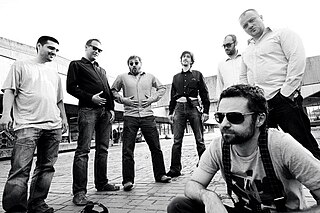
Sarajevo is the capital and largest city of Bosnia and Herzegovina and of the Federation of Bosnia and Herzegovina, with a population of 275,524 in its administrative limits. The Sarajevo metropolitan area including Sarajevo Canton, East Sarajevo and nearby municipalities is home to 555,210 inhabitants. Located within the greater Sarajevo valley of Bosnia, it is surrounded by the Dinaric Alps and situated along the Miljacka River in the heart of the Balkans, a region of Southeastern Europe.

Like the surrounding Balkan countries, Bosnia and Herzegovina has had a turbulent past marked by frequent foreign invasions and occupation. As a result, Bosnian music is now a mixture of Slavic, Turkish, Central European, Mediterranean, and other influences.

The Sarajevo Film Festival is the premier and largest film festival in Southeast Europe, and is one of the largest film festivals in Europe. It was founded in Sarajevo in 1995 during the siege of Sarajevo in the Bosnian War, and brings international and local celebrities to Sarajevo every year. It is held in August and showcases an extensive variety of feature and short films from around the world. The current director of the festival is Jovan Marjanović.
Baščaršija Nights is the biggest culture festival in Sarajevo, Bosnia and Herzegovina. Taking place throughout July every year, it celebrates various aspects of the nation's culture, and includes performances of classical music, rock and roll and folk music; live theatre; various exhibits and folklore displays; as well as books, film, children's programming, opera and ballet.

The Culture of Sarajevo is represented in various ways.

Lesbian, gay, bisexual, and transgender (LGBT) people in Bosnia and Herzegovina may face legal challenges not experienced by non-LGBT residents. Both male and female forms of same-sex sexual activity are legal in Bosnia and Herzegovina. However, households headed by same-sex couples are not eligible for the same legal protections available to opposite-sex couples.

Safet Isović was a Bosnian singer who performed the Bosnian traditional music sevdalinka.

Hari Mata Hari is a Bosnian pop band. Hari Mata Hari is the stage name for the singer Hari Varešanović. The group originated from the city of Sarajevo, the capital of Bosnia and Herzegovina. The group has performed over 1,000 concerts and sold 5 million albums to date. Their songs are among the most famous and popular love ballads in the former Yugoslavia era. Hari Mata Hari was the representative of Bosnia and Herzegovina at the Eurovision Song Contest 2006 held in Athens, Greece. Coincidentally, hari mata hari in Malay stands for 'day of the sun, or Sunday'.

Tourism in Bosnia and Herzegovina is a fast-growing sector making up an important part in the economy of the country.
Aldin Kurić, known by his stage name Al'Dino, is a Bosnian singer, songwriter and composer.
Adi Lukovac was a Bosnian musician, best known as the pioneer of electronic music in Bosnia and Herzegovina and leader of the Bosnian industrial band Adi Lukovac & The Ornaments.

Sikter was a Bosnian alternative rock band from Sarajevo. The band was formed in 1990 as a punk rock project of a few students, but became one of the most successful Bosnian rock bands. The name of the band is translated as Buzz Off!

My Music is the third and most successful studio album by Bosnian alternative rock band Sikter. It was released on 21 August 2005 by Bosnian label Gramofon. Album was recorded from 2003 to 2005 at MML Studio in Sarajevo and mixed at MGKS Studio in Sarajevo 2005. Cover of album was made by bassist of the band Dragan Rokvić.
Sinan Alimanović is a Bosnian jazz pianist, organist, composer, conductor, arranger and educator.

Merima Ključo is a Bosnian concert accordionist and composer. In 1993 she moved to the Netherlands as a refugee of the Bosnian War. Currently she is a Bosnian-Dutch citizen. After receiving a Genius visa in 2011 she became an American resident and is based in Los Angeles.

Damir Imamović born in 1978, stands as a luminary figure in the realm of Bosnian music, wielding expertise as a musician, singer, composer, and preeminent authority on the traditional melodies of Bosnia and Herzegovina, specifically the evocative "sevdalinka" or "sevdah". Notably, he clinched the coveted title of "The Best Artist of Europe" at the esteemed 2021 Songlines World Music Awards, solidifying his position as a noteworthy force in the musical landscape.

The Jazz Fest Sarajevo is an international music festival held annually during the first week of November in Sarajevo and is the largest of its kind in Southeastern Europe.

Maja Milinković is a Bosnian fado singer and songwriter, born in Sarajevo, the capital of SR Bosnia and Herzegovina.

The Ilidža Folk Music Festival is the oldest living and premier folk music festival in the Former Yugoslavia. It is held annually in Ilidža, Sarajevo, Bosnia and Herzegovina. The festival was established in 1964 by the Association of Bosnian Recording Artists, is held in July and lasts for four days. The event hosts contemporary and traditional artists in genres under the umbrella of Folk, including Sevdalinka, Starogradska, Modern Folk, Novokomponovana, Macedonian Folk, Turbo-folk and accordion music. It has traditionally been the premier showpiece event for folk recording artists in Yugoslavia, with the two major Yugoslav record labels Jugoton and PGP-RTS releasing live LPs of each year's edition. Numerous acclaimed folk singers from the Former Yugoslavia were either signed by record labels or received wider media exposure following performances at the festival. Serbian Turbo-folk star Ceca performed at the 1988 edition when she was 15 years old and won the competition with her single Cvetak Zanovetak, while Hanka Paldum was signed by Diskoton after winning the newcomer competition in 1974.

Zoster is a pop-reggae group from Bosnia and Herzegovina formed in Mostar in 2000.















